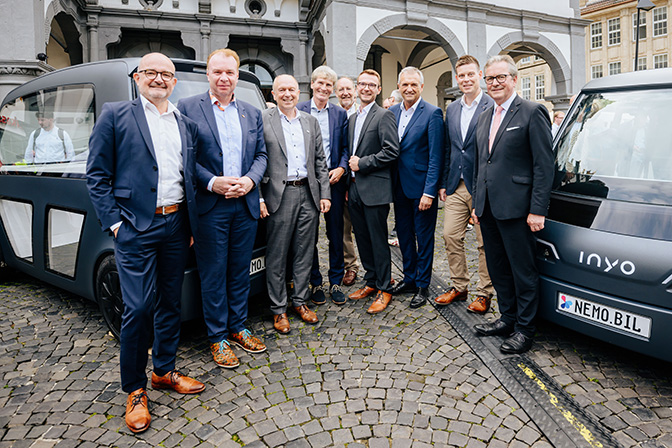Vice-Chancellor and Economics Minister Robert Habeck recently visited the Neue Mobilität Paderborn (NeMo) initiative, whose NeMo.bil project is funded by his ministry with 17 million euros. During a technical discussion at the Paderborn Town Hall, it became clear that the NeMo.bil project has the potential to revolutionize mobility in rural areas. The NeMo initiative offers valuable approaches to making on-demand mobility in public transport scalable.
NeMo focuses on the development and implementation of a swarm-like mobility system that can supplement and revolutionize local public transport. Mobility-energy interfaces are established at central hubs. Journeys are made individually as needed, proceeding without interruptions and without changing vehicles from the starting point to the destination. This approach makes individual public transport convenient and socially equitable. Given the central aspect of sustainability, the Paderborn region is ideally suited for a pilot implementation because more renewable electricity is generated here than is consumed.
The expert discussion chaired by Minister Habeck was attended by Christoph Rüther (District Administrator of Paderborn, representing municipalities and public transport authorities), Jonathan Behm (Neue Mobilität Paderborn e.V., Network for Mobility Ecosystems), Frank Köster (DLR, Science Data and Digitalization), Marcus Zwick (INYO Mobility GmbH, consortium leader NeMo.bil, vehicle OEM), Mario Nowack (Leipziger Verkehrsbetriebe, project manager ABSOLUT, public transport operator), Michael Walther (Ministry for the Environment, Nature Conservation and Transport in NRW), Michael Dreier (Mayor of Paderborn), Norika Creuzmann (Member of the NRW State Parliament), and Stephan Melzer (msg systems AG, Data and Digitalization). Ernst Stöckl-Pukall and Stefan Heidemann from the Federal Ministry for Economic Affairs and Climate Protection provided expert support.
During the expert discussion, experts from all over Germany discussed how they can collaborate to make on-demand mobility scalable throughout the country. The participants put forward a concrete proposal: with the support of the Federal Ministry for Economic Affairs and Climate Protection (BMWK) and the Federal Ministry for Digital and Transport Affairs (BMDV), a community should be created to develop standards and methods for these solutions and the corresponding markets. This community should establish the technical foundation for implementation and provide initial offerings and applications based on this foundation.
Federal Minister Habeck emphasized that enabling mobility for everyone, including in rural areas, is a central task and crucial for strengthening the equality of living conditions. He noted that autonomous on-demand shuttles could make a significant contribution in this regard. Habeck described the New Mobility project as one of the most promising mobility initiatives in Germany. He stressed the importance of working together on solutions that can be implemented quickly on a broad and supra-regional scale.
In addition, Neue Mobilität Paderborn presented the latest cab prototypes of the NeMo.bil project, developed by INYO Mobility, at the town hall square. During the information event at the town hall, citizens had the opportunity to learn more about the project. The project partner dSpace demonstrated an impressive simulation of the autonomously driving cabs in a rural community.
From left to right: Andreas Speith, Chair NeMo Verein, GEO Westfalen Weser Netz GmbH; Ullrich Lange, Major of Bad Lippspringe; Christoph Rüther, Deputy Chair NeMo Vereinr, District Chief Executive Paderborn; Prof. Dr. Nikolaus Risch, former President University Paderborn; Wilfried Rostek; Jonathan Behm, CEO NeMoVerein; Burkhard Deppe, Major of Bad Driburg; Michael Scholle, Deputy Major Bad Driburg; Michael Dreier, Major of Paderborn.



